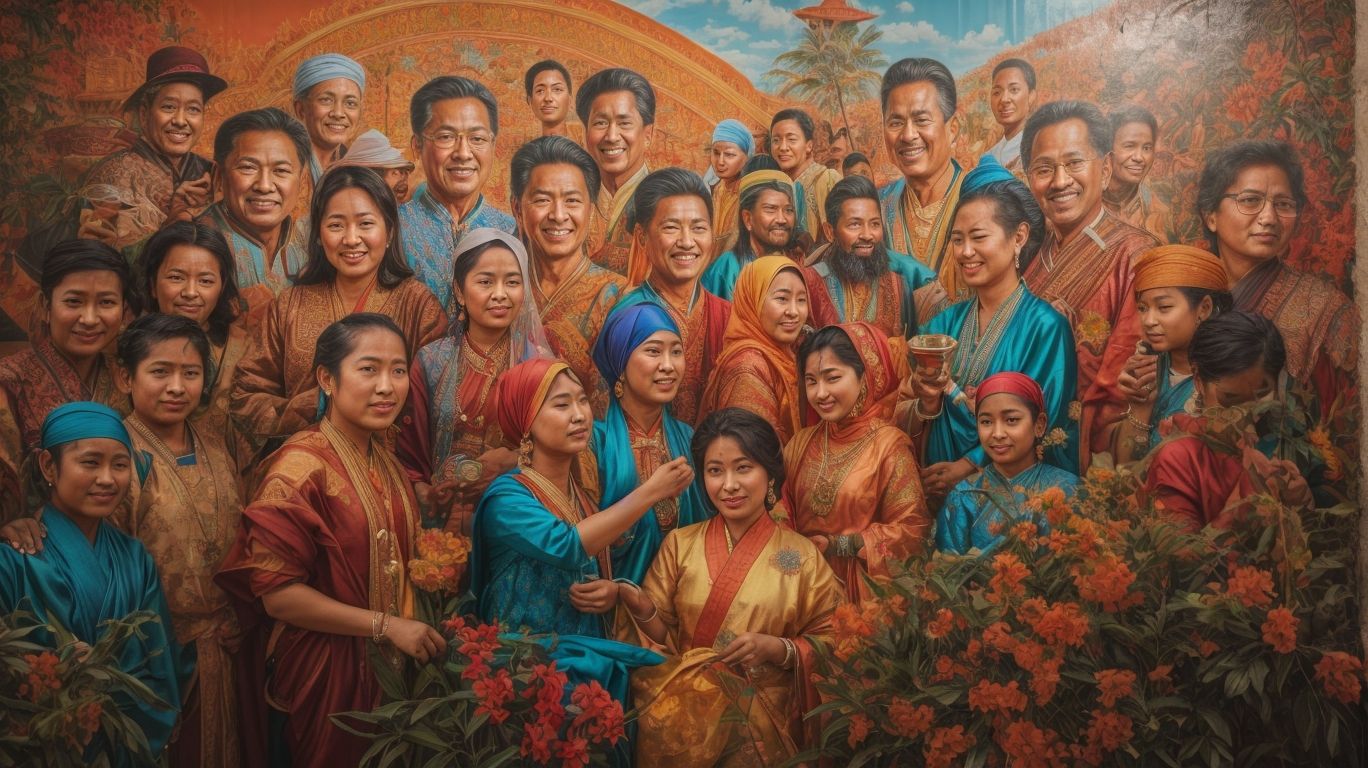
Welcome to the colorful and vibrant country of Vietnam, where ancient traditions and modern technology coexist in perfect harmony. If you are thinking of moving to Vietnam as an expat, this article is a must-read for you. As an expat myself, I have experienced the challenges and joys of living in this beautiful country, and I am excited to share my insights with you. So, buckle up and get ready for some intriguing and enlightening tales of expat life in Vietnam.
Why Vietnam is a Popular Destination for Expats?
Vietnam has become a sought-after destination for expats due to several factors.
Firstly, the country’s cost of living is lower compared to many Western countries, making it an attractive option for those looking for a more affordable lifestyle.
Secondly, Vietnam boasts a rich culture and history, as well as breathtaking natural landscapes, making it an appealing place to live.
Additionally, the warm climate all year round is a draw for expats coming from colder regions.
Lastly, the welcoming and friendly population of Vietnam makes expats feel right at home.
What Are the Benefits of Living in Vietnam as an Expat?
As an expat living in Vietnam, there are numerous benefits that can be enjoyed in this beautiful and dynamic country. In this section, we will discuss the various advantages of choosing Vietnam as your new home. From the affordable cost of living to the vibrant culture and history, there is much to explore and experience in this Southeast Asian gem. Additionally, we will touch on the delicious food and career opportunities that make Vietnam a desirable destination for expats. So, let’s dive in and discover the perks of living in Vietnam.
1. Affordable Cost of Living
Living in Vietnam as an expat offers the benefit of a cost-effective lifestyle, allowing individuals to make the most out of their budget. Here are some steps to consider when preparing for this aspect:
- Research housing options and prices to find affordable accommodations.
- Explore local markets and street food stalls for budget-friendly meals.
- Utilize public transportation, such as buses or motorbikes, to save on commuting expenses.
- Take advantage of the low cost of healthcare and medical services.
Pro-tip: Engage with the local community to discover hidden gems and get insider tips on affordable living options.
2. Vibrant Culture and History
Vietnam’s vibrant culture and rich history make it an appealing destination for expats. The country has a diverse and multicultural society, with influences from Chinese, French, and indigenous traditions. Expats can immerse themselves in the lively street markets, traditional festivals, and historical landmarks like the ancient town of Hoi An or the imperial city of Hue. Additionally, Vietnam’s long history of resilience and revolution offers a fascinating lens into its past.
To fully experience the vibrant culture and history of Vietnam, expats can participate in cultural activities, visit museums and historical sites, and engage with the local community.
3. Delicious Food
Vietnam is renowned for its delectable cuisine, making it a food lover’s paradise. To fully enjoy the culinary delights as an expat, consider the following steps:
- Explore Local Markets: Visit bustling markets like Ben Thanh in Ho Chi Minh City or Dong Xuan in Hanoi to sample fresh produce and street food.
- Try Iconic Dishes: Indulge in traditional dishes like pho, banh mi, and spring rolls, which showcase the vibrant flavors of Vietnamese cuisine.
- Embrace Street Food Culture: Savor the authentic taste of Vietnam by trying street food vendors’ offerings, such as bun cha, banh xeo, and com tam.
- Join Cooking Classes: Immerse yourself in the local culture by taking cooking classes to learn how to prepare Vietnamese delicacies like a pro.
Whether it’s savoring a bowl of steaming pho or exploring the diverse street food scene, Vietnam’s delicious food will undoubtedly leave your taste buds craving for more.
4. Opportunities for Career Growth
Opportunities for career growth in Vietnam are abundant, making it an attractive destination for expats. Here are some steps to take advantage of these opportunities:
- Research the job market: Familiarize yourself with the industries that are thriving in Vietnam, such as technology, manufacturing, tourism, and finance.
- Network and build connections: Attend industry events, join professional organizations, and utilize online platforms to connect with local professionals and potential employers.
- Learn the local language: While English is widely spoken, knowing Vietnamese can give you an edge and open up more job opportunities.
- Seek out international companies: Many multinational companies have a presence in Vietnam, offering career advancement opportunities and the chance to work in a global environment.
- Stay updated on industry trends: Keep yourself informed about the latest developments in your field, attend workshops and conferences, and continuously enhance your skills.
By following these steps, you can position yourself for success and maximize your career growth in Vietnam. Good luck in your professional journey!
What Are the Challenges of Living in Vietnam as an Expat?
Living as an expat in Vietnam can be a thrilling and enriching experience, but it also comes with its fair share of challenges. In this section, we will dive into the various obstacles that expats may face while living in Vietnam. From the language barrier to cultural differences, visa restrictions to pollution and traffic, we will explore the different aspects that can make adjusting to life in Vietnam a bit more difficult for expats. So, buckle up and get ready to learn about the challenges of living in Vietnam as an expat.
1. Language Barrier
Overcoming the language barrier is a crucial step for expats living in Vietnam.
Acquire basic Vietnamese phrases to aid in daily communication.
Enroll in language classes or employ a tutor to enhance language skills.
Immerse yourself in the local culture by engaging with locals and practicing the language.
Utilize language learning apps or online resources to supplement your learning.
Join language exchange groups or conversation clubs to practice speaking with native speakers.
2. Cultural Differences
Cultural differences play a significant role when living in Vietnam as an expat. To fully enjoy your time in the country, it is essential to understand and respect the local customs and traditions.
Some notable cultural differences in Vietnam include:
- The concept of face-saving.
- Hierarchical social structures.
- The emphasis on family and community.
Adapting to these nuances, such as using appropriate titles when addressing people and being mindful of public displays of affection, is crucial. Embracing these cultural differences can deepen your understanding and appreciation of Vietnamese culture, as well as strengthen your connections with the local community.
3. Visa Restrictions
When considering living in Vietnam as an expat, it is important to be aware of any restrictions that may apply to obtaining a visa. To navigate this process effectively, here are some steps to follow:
- Research Visa Types: Understand the different types of visas available for expats, such as tourist visas, work permits, or business visas.
- Consult Immigration Laws: Familiarize yourself with the specific visa requirements, duration of stay, and any restrictions or limitations that may apply.
- Prepare Documentation: Gather all necessary documents, including a valid passport, visa application forms, proof of accommodation, and financial statements.
- Apply in Advance: Submit your visa application well in advance to allow for processing time, ensuring that all required documents are included.
By following these steps and staying informed about any visa restrictions, expats can ensure a smooth transition and legally enjoy their time living in Vietnam.
4. Pollution and Traffic
Living in Vietnam as an expat can present challenges related to pollution and traffic, but there are steps you can take to navigate these issues:
- Avoid peak traffic times by planning your schedule accordingly.
- Use alternative modes of transportation such as motorbikes or bicycles to avoid getting stuck in traffic.
- Wear a face mask to protect yourself from pollution and traffic when necessary.
- Choose a living location away from heavily congested areas.
What Is the Expat Community Like in Vietnam?
The expat community in Vietnam is a lively and diverse one. People from all over the world choose to come to Vietnam for a variety of reasons, including job opportunities, retirement, or simply to immerse themselves in a new culture. Known for their welcoming and friendly nature, expats in Vietnam often form close friendships and social groups. Additionally, there are numerous expat organizations and clubs that offer support and plan events and activities. Whether it’s attending a language exchange meetup, joining a sports club, or volunteering for a local charity, there are countless ways for expats to connect and get involved in the vibrant community in Vietnam.
1. How Do Expats Socialize in Vietnam?
Expats in Vietnam have numerous opportunities to socialize and connect with others in the community.
- Join expat groups and organizations: Many cities in Vietnam have established expat groups that host social events, language exchanges, and cultural activities.
- Attend networking events: Professional networking events provide expats with the chance to meet individuals with similar interests and expand their professional network.
- Participate in sports and hobby clubs: By joining sports teams or hobby clubs, expats can meet others who share their interests and participate in activities together.
- Explore social media platforms: Expats can also utilize social media groups and forums specifically for those living in Vietnam to connect with others and seek advice.
2. What Are the Most Popular Expat Hangouts?
When living in Vietnam as an expat, there are several popular hangouts where expats can socialize and connect with one another. These hangouts offer a familiar environment and a chance to meet people from around the globe. Some of the most popular expat hangouts in Vietnam include:
- Bui Vien Street in Ho Chi Minh City, known for its vibrant nightlife and numerous bars and restaurants.
- The Old Quarter in Hanoi, a bustling area with charming cafes and rooftop bars.
- Hoi An Ancient Town, a UNESCO World Heritage Site famous for its lantern-filled streets and riverside bars.
- Da Nang’s My Khe Beach, where expats gather to relax, enjoy water sports, and socialize at beachside cafes and bars.
These hangouts provide expats with a sense of community and the opportunity to make new friends while experiencing the vibrant culture of Vietnam.
What Are Some Common Expat Experiences in Vietnam?
Moving to a new country can be both exciting and challenging, and expats in Vietnam are no exception. In this section, we will discuss some of the common experiences that foreigners face while living in this vibrant and diverse country. From finding suitable accommodation to navigating the local transportation system, adapting to the climate, and dealing with homesickness, we will explore the ups and downs of expat life in Vietnam. So, let’s dive into the tales of expat life in this beautiful Southeast Asian nation.
1. Finding Accommodation
Finding accommodation in Vietnam as an expat can be made easier by following a few steps:
- Research: Begin by researching the different neighborhoods or cities in Vietnam that are popular among expats.
- Set a Budget: Determine your budget for accommodation and consider factors such as utilities and transportation costs.
- Use Online Platforms: Utilize online platforms like local real estate websites or expat forums to search for available properties.
- Engage with Real Estate Agents: Connect with local real estate agents who specialize in helping expats find suitable accommodation.
- Visit Properties: Once you have shortlisted a few options, schedule visits to the properties to get a firsthand look and assess their suitability.
- Negotiate and Sign Lease: Negotiate the rental terms and conditions with the landlord and sign the lease agreement once both parties are satisfied.
- Secure Required Documents: Ensure that you have all necessary documents, such as copies of your passport and visa, to provide to the landlord.
Remember to start your accommodation search early and be flexible in your requirements to increase your chances of finding the perfect place to live in Vietnam. Good luck with your search!
2. Navigating the Local Transportation System
Navigating the local transportation system in Vietnam can be overwhelming but with proper preparation, it becomes manageable. Here are some steps to help expats get around efficiently:
- Research transportation options: Familiarize yourself with the different modes of transportation available such as buses, taxis, motorbikes, and cyclos.
- Learn the routes: Study the local transportation maps and routes to understand where each mode of transportation can take you.
- Use public transportation apps: Install apps like Grab or GoViet to easily book taxis or motorbike rides.
- Be cautious on the roads: Traffic in Vietnam can be busy and chaotic, so always be aware of your surroundings and follow traffic rules.
- Consider renting a motorbike: If you’re comfortable riding a motorbike, renting one can be a convenient way to navigate the city.
- Take advantage of local knowledge: Ask locals for recommendations on the best routes and transportation options for specific destinations.
3. Adapting to the Climate
Adapting to the climate in Vietnam as an expat requires taking certain steps to ensure comfort and well-being.
- Stay hydrated: The hot and humid climate in Vietnam can lead to dehydration. Drink plenty of water throughout the day.
- Dress appropriately: Choose light, breathable clothing made from natural fabrics to help you stay cool. Protect yourself from the sun by wearing hats and using sunscreen.
- Gradually acclimatize: Give your body time to adjust to the climate by gradually increasing your outdoor activities and exposure to heat.
- Take breaks indoors: Seek air-conditioned spaces or shade during the hottest parts of the day to avoid heat exhaustion or heatstroke.
4. Dealing with Homesickness
Coping with homesickness as an expat in Vietnam can be challenging, but there are steps you can take to ease the adjustment:
- Stay connected: Maintain regular communication with loved ones back home through video calls, emails, and social media.
- Create a routine: Establish a daily schedule and engage in activities you enjoy to help distract from feelings of homesickness.
- Explore the local culture: Immerse yourself in the vibrant Vietnamese culture by learning about their traditions, trying new foods, and participating in local events.
- Build a support network: Connect with fellow expats and locals who share similar experiences and interests through social clubs, expat groups, or language exchange programs.
How Can One Prepare for Living in Vietnam as an Expat?
Moving to a new country can be both exciting and daunting, especially when it’s a place as vibrant and diverse as Vietnam. As an expat, preparation is key to making the most out of your new life in this beautiful country. In this section, we will discuss the essential steps one should take to prepare for living in Vietnam. From researching the culture and customs to connecting with other expats, these tips will help you navigate your new home with ease. So, let’s dive into the key aspects of preparing for life as an expat in Vietnam.
1. Researching the Culture and Customs
Expats looking to smoothly transition and adapt to their new environment in Vietnam should prioritize researching the culture and customs. Here are some steps to consider:
- Learn about Vietnamese traditions, etiquette, and social norms.
- Understand the local customs related to greetings, gift-giving, and dining etiquette.
- Familiarize yourself with the major holidays and festivals celebrated in Vietnam.
- Read books, watch movies, or listen to music from Vietnam to gain insights into the country’s culture.
Pro-tip: Engaging in cultural exchange activities, such as learning the Vietnamese language, joining local social groups, or participating in cultural events, can further enhance your understanding and integration of the culture.
2. Learning Basic Vietnamese Phrases
Learning basic Vietnamese phrases can greatly enhance your experience as an expat in Vietnam. Here are some steps to get started:
- Begin with greetings: Familiarize yourself with how to say “hello” (xin chào) and “thank you” (cám ơn).
- Master essential phrases: Practice common phrases like “excuse me” (xin lỗi), “sorry” (xin lỗi), and “yes” (vâng) to assist in daily interactions.
- Numbers and currency: Educate yourself on numbers and currency to navigate shopping, bargaining, and ordering food.
- Food and beverages: Memorize phrases for ordering food and drinks, such as “I would like…” (Tôi muốn…) or “How much does it cost?” (Bao nhiêu tiền?).
The Vietnamese language has a rich history, influenced by Chinese and French colonization. Learning basic Vietnamese phrases not only aids in communication, but also demonstrates respect for the local culture and can lead to meaningful connections with the people of Vietnam.
3. Saving Enough Money for Initial Expenses
To ensure enough funds for initial expenses when relocating to Vietnam as an expat, follow these steps:
- Create a budget to determine your monthly income and expenses.
- Research the cost of living in Vietnam to estimate your monthly expenses.
- Set aside a portion of your income each month specifically for initial expenses.
- Reduce unnecessary spending by cutting back on non-essential items or activities.
Many expats have successfully saved enough money for their initial expenses in Vietnam by following these steps. Through careful financial management and prioritizing saving, they were able to comfortably settle into their new life and embrace the opportunities that Vietnam has to offer.
4. Connecting with Other Expats
Connecting with other expats in Vietnam is crucial for building a support system and fostering a sense of community. Follow these steps to help you connect with other expats:
- Join online expat groups and forums to connect with like-minded individuals.
- Attend expat events and networking meetups to meet new people and expand your social circle.
- Participate in language exchange programs or join local clubs and organizations based on your interests to meet both locals and other expats.
- Utilize social media platforms to find expat groups and communities in Vietnam. Share your experiences and seek advice from others.
Connecting with other expats can greatly enhance your experience in Vietnam and assist you in navigating the challenges of living in a new country.






